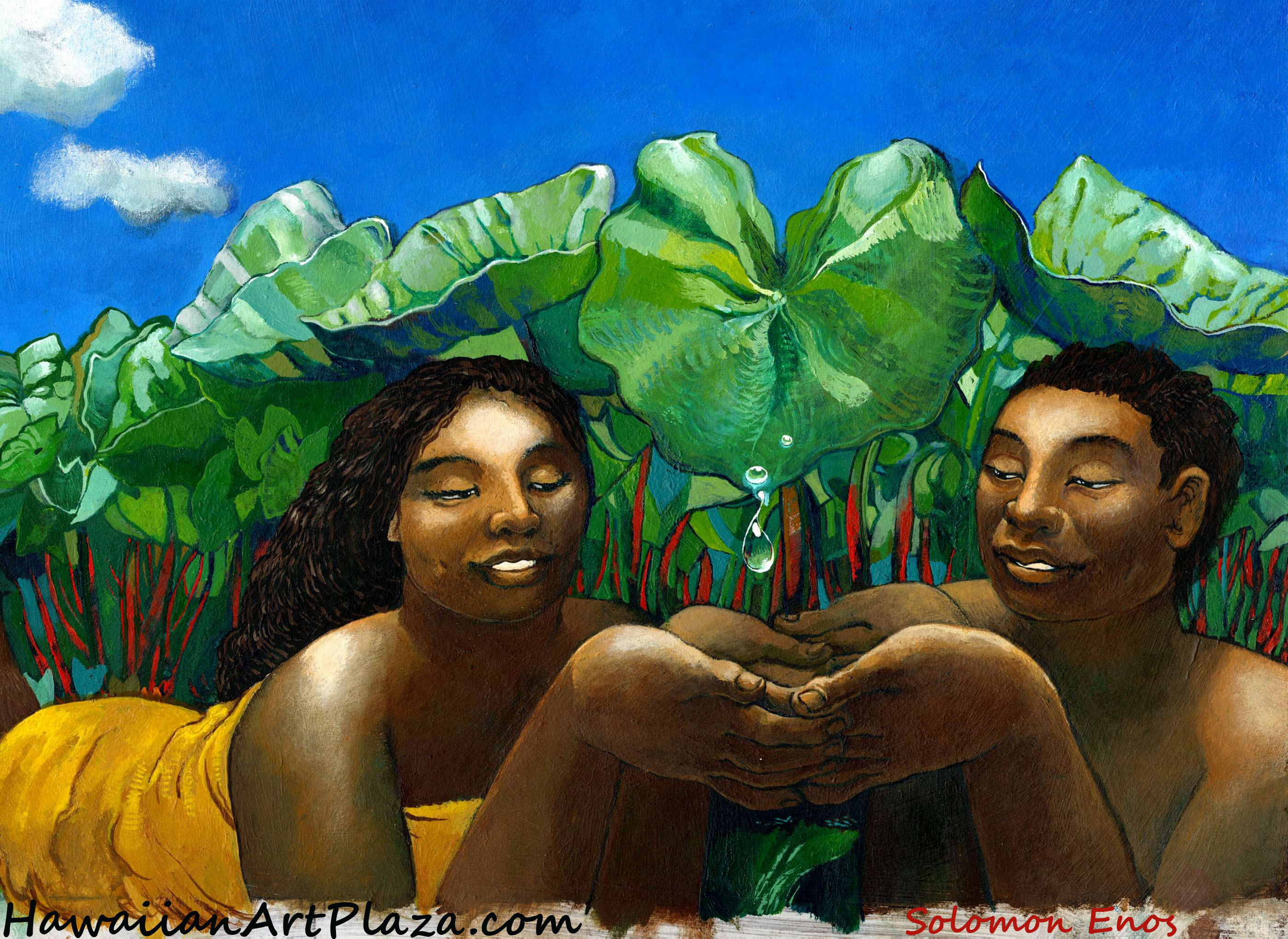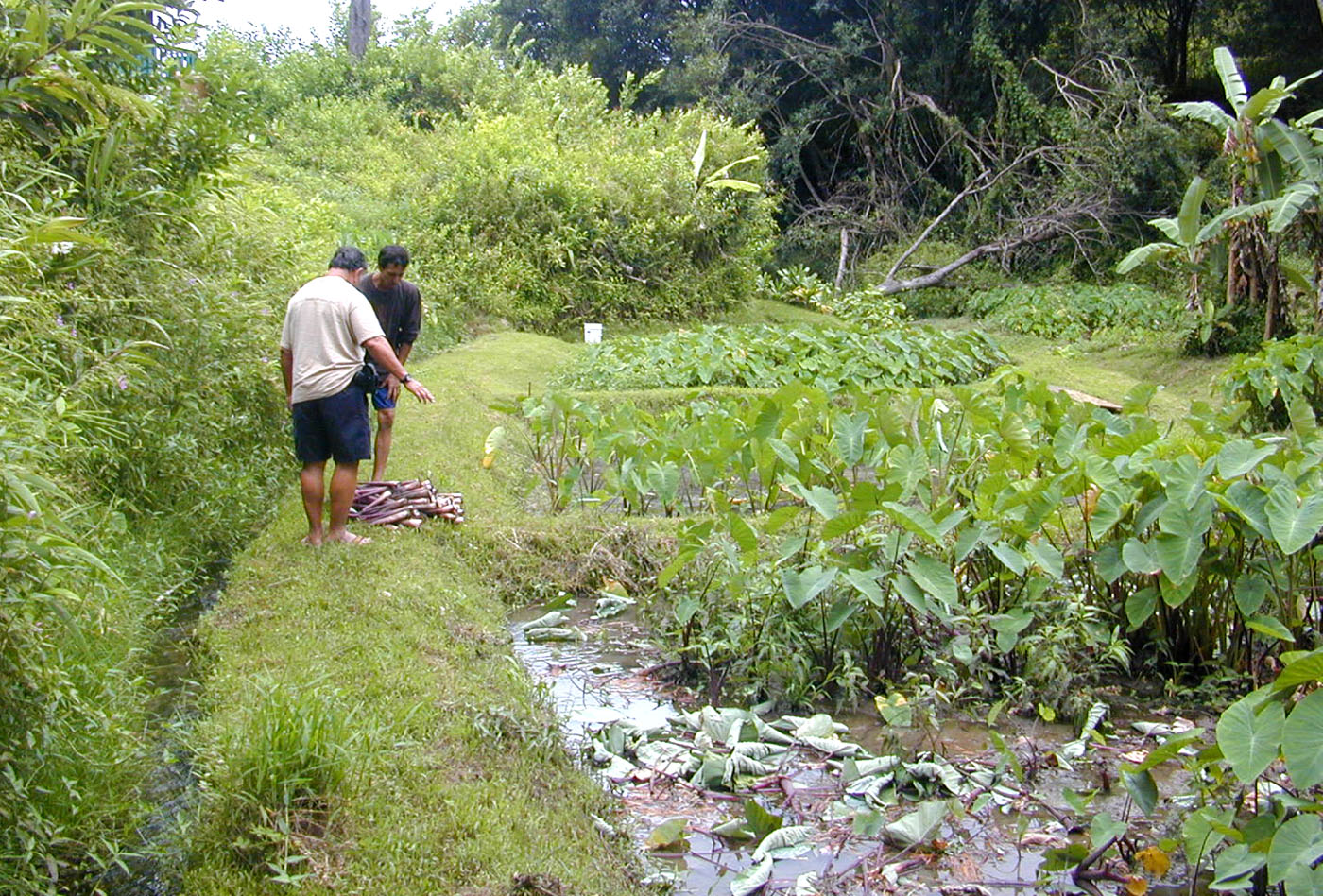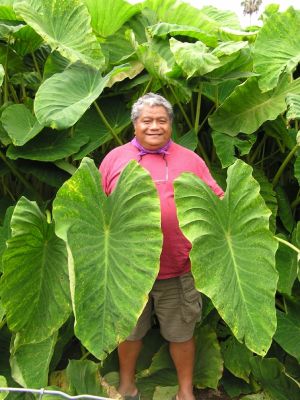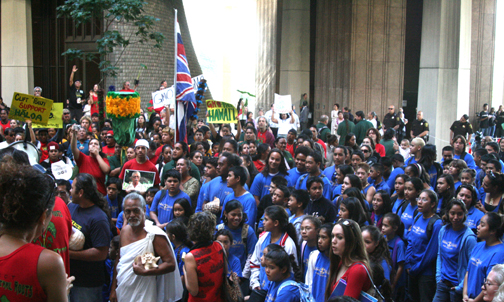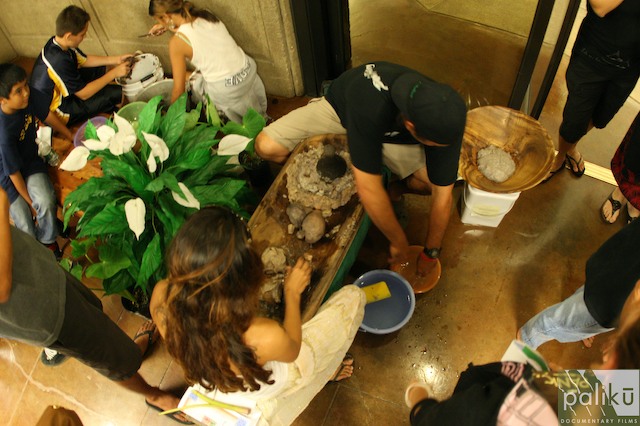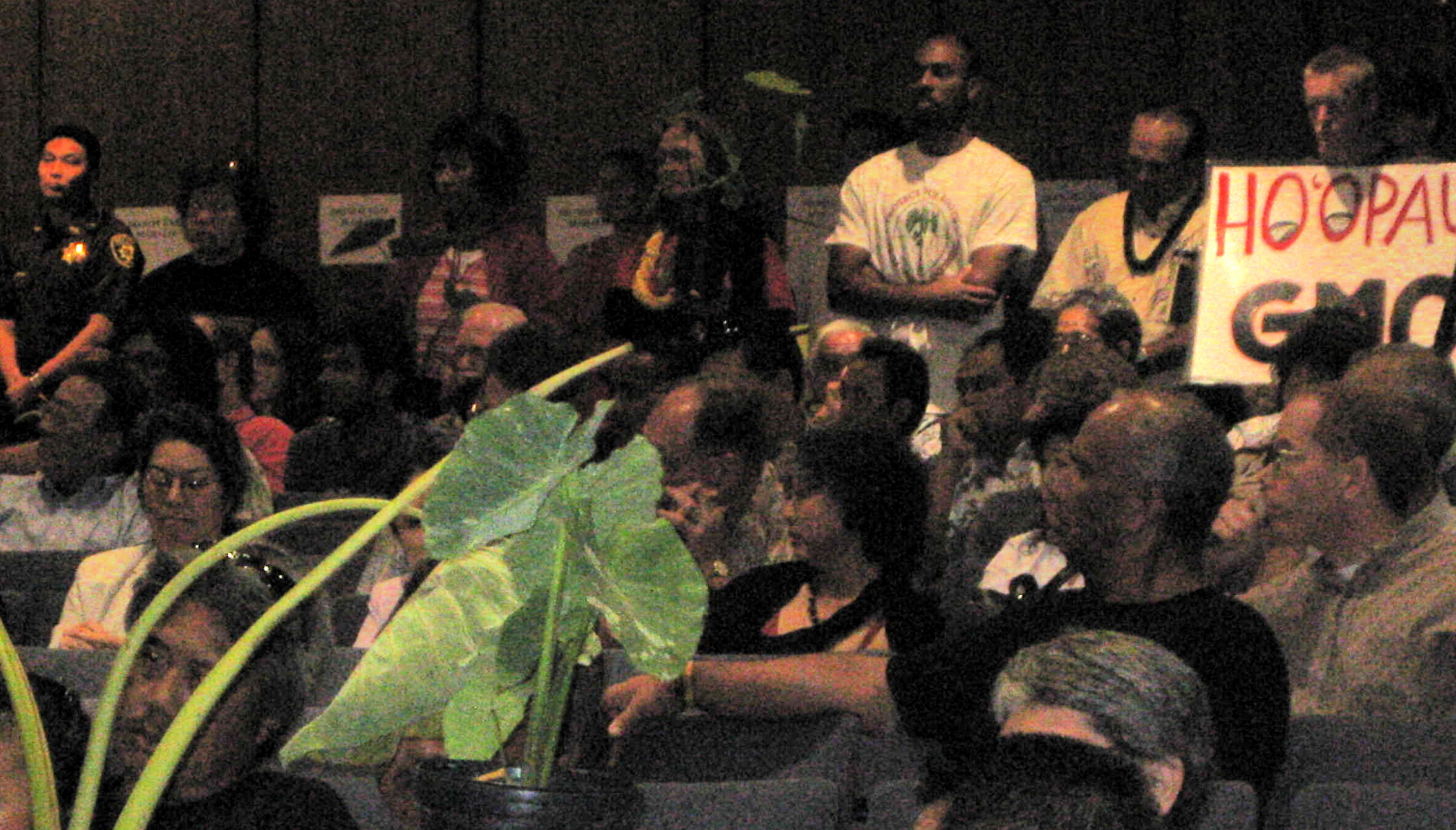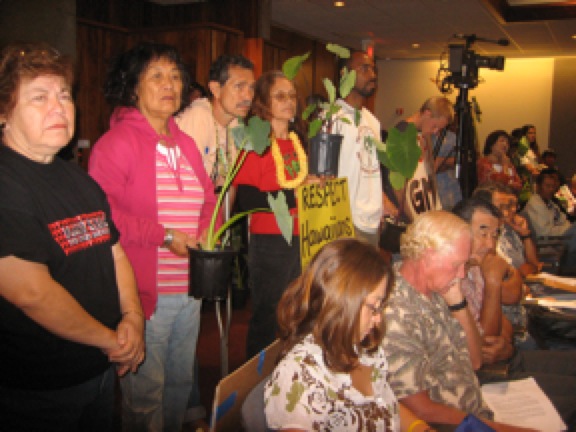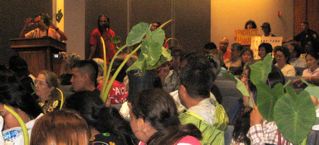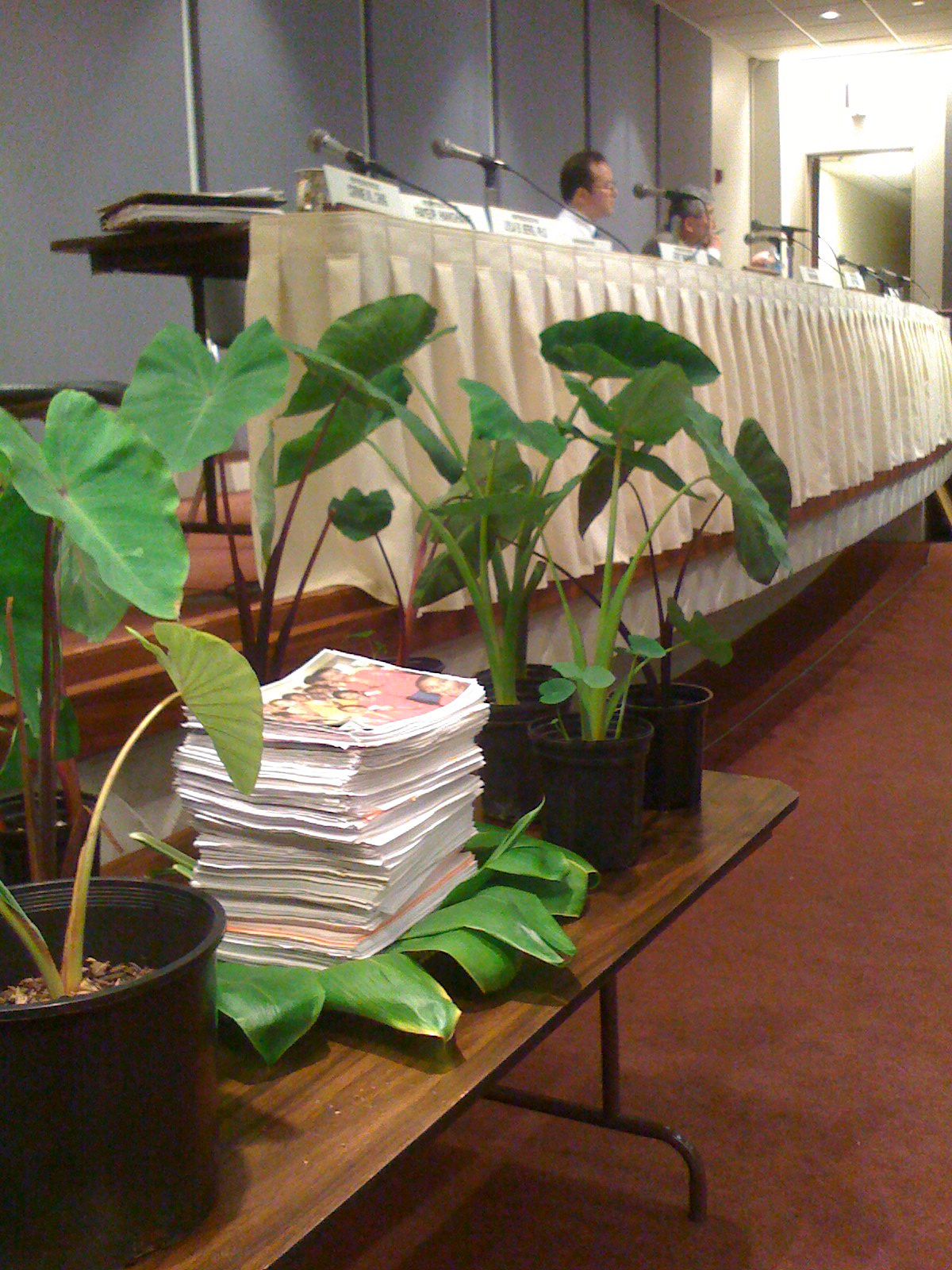Blog
News, updates, finds, stories, and tidbits from staff and community members at KAHEA. Got something to share? Email us at: kahea-alliance@hawaii.rr.com.
Historic Vote: Hawai'i Island says "No Thanks" to GMO Taro and Coffee!!
From Jim Quirk’s article in Hawai’i Island Daily West Hawaii Today:
The Hawaii County Council voted 9-0 Wednesday in favor of a bill from North Kona Councilman Angel Pilago on its second reading to ban genetically modified taro and coffee.
It was a circus-like atmosphere Wednesday in Hilo’s Ben Franklin building, where the meeting was held. Children played in the hallways outside of the council chambers waiting for their chance to speak along with their parents. A man standing in the hallway corner sang as he strummed the strings of a guitar.
The council, meanwhile, listened to a different tune, one delivered by the seemingly endless convoy of residents who took turns at the microphone to give their two cents on the proposed ban.
About 70 residents testified in Hilo, while about 30 testified via teleconference from the council offices in Waimea and Kona. There have been no major complaints about banning genetically modified taro, but with coffee it’s a different story.
On one side of the debate are those who believe genetic modification of coffee could eventually spell disaster for the island’s coffee industry. Off-island buyers would not be interested in Kona coffee that has been purposely or accidentally genetically modified, the proponents believe.
Then there are residents who believe, among other things, without genetic modification of coffee, there will be no scientific answers when disease strikes and destroys Big Island coffee.
A vast majority of residents who spoke Wednesday said they were in favor of the ban.
Dr. Hector Valenzuela, a vegetable crops extension specialist with the University of Hawaii at Manoa, said he — unlike all of his peers at the college — supports the bill.
He said the scientific community should be concentrating on aspects of agricultural research, such as teaching farmers how to sustain crops without having to rely on chemicals, rather than genetic modification.
Bill proponent Chuck Moss, a Kona coffee farmer, said one potentiality of genetically modified coffee is that experiments in creating coffee trees without caffeine could spread to other trees. If that happened, it would be hard to market Kona coffee, he said.
“How can you tell the difference from a regular tree from a decaf tree, or a regular bean from a decaf bean?” Moss asked.
Hamakua Councilman Dominic Yagong furnished results of a poll he conducted recently that shows 82 percent of 89 Big Island coffee farmers support the bill.
He said during a separate interview that his office identified isle coffee farmers using the phone book, Internet and personal knowledge.
During a previous meeting, representatives of the Hawaii Coffee Council indicated a majority of island coffee farmers are against the bill, Yagong said, which is why he wanted to conduct a poll to find out for sure.
Hilo Councilman Stacy Higa, who voted against the bill on its first reading, said Yagong’s survey changed his mind.
Mayor Harry Kim, who is still not back to work full time because of his recent heart attack, made an appearance early in the meeting and expressed concerns that the bill wouldn’t allow genetic testing of coffee in the lab setting.
He requested the council consider developing a system where research at places like the University of Hawaii at Hilo would be able to continue.
Kim could attempt to veto the bill, but it seems unlikely it would succeed because of the unanimous council vote Wednesday.
Water Win: Hundreds Respond to Taro Farmers' Call for Help
Art kindly donated by Solomon Enos, Hawaiian Artist/Farmer.
Support Native Art! www.HawaiianArtPlaza.com
A big MAHALO! is due to the hundreds of people who responded to the call from taro farmers! They submitted testimony in droves and packed the room at the Water Commission hearing last Wednesday in Haiku–to demand that East Maui Irrigation Company (EMI) stop diverting every last drop of water from the streams of East Maui.
The Commission took two days’ worth of public testimony and ultimately agreed with the taro farmers, scientists, and general public that EMI is diverting too much water from at least 8 of the 27 streams at issue. The Water Commission ruled that EMI must return at least 12 million gallons of water a day to those 8 streams in order for the native stream life to survive.
This is a historic decision was made possible only by the consistent and growing public pressure to uphold the constitutional rights of taro farmers and the legal obligations of the state to protect native ecosystems against the profit-seeking interests of corporations. Mahalo piha to everyone who took the time to participate. This decision will serve as a model for water restoration efforts throughout the islands.
Here is the mahalo we got from the attorney for the taro farmers in East Maui, Alan Murakami with the Native Hawaiian Legal Corporation:
Mahalo nui loa for all the help… I think it really helped get the word out and I was impressed by the hundreds that responded to our call for help.
There is still much to do during the so-called “Adaptive Management System” being overlaid on this decision. It simply means that the staff will use the next year to do what it was supposed to do before the decision on appurtenant rights…
In short, I think the community pressure put on the company and the commission worked wonders. You should congratulate yourself for the supportive work you did. Now the implementation… more work to do and I hope I can count on all of you to post the updated information as it becomes available – both good and bad. I certainly think the news of the almost miraculous restoration of conditions at the muliwai is one of the headline things to report.
The fight continues today with a contested case hearing in Haiku to invalidate the leases improperly issued to EMI and its parent corporation, Alexander & Baldwin, for use of the land where the diversions are located. Whatever the outcome of this contested case, history has already been made in East Maui and nothing can stop the people-powered momentum towards restoring all the streams that have been improperly and immorally diverted from their nature course for far too long by multi-national industrial agriculture corporations. Stay tuned for updates on this string of historic decisions.
Mahalo nui loa to the people of East Maui for continuing this historic fight, and their legal team at the Native Hawaiian Legal Corporation.
Life is where the water is.
As the Hawaiian kupuna and natural resource experts had foretold- just one month after restoring stream flow to Waikane stream, in Wailuanui East Maui, native marine life has already re-inhabited the stream, estuary (muliwai) and bay. The local community can finally return to their traditional practices such as farming, fishing, and enjoying the cool water recreationally. It had been 30 years since the Waikane native ecosystem existed in its natural healthy state. It is hoped that coming generations will not have to experience the environmental devastation that the community has suffered without water.
Planting Your Vote, Taking Names
Since the announcement late last week about the attempt to corrupt and co-opt traditional farmers’ attempt to secure a simple 10-year moratorium on GMO taro, we’ve heard your outrage! Many of you have written to ask for details about the vote. You’re getting ready to plant your vote, and you’re taking names!
NINE Ayes (Voted pro-GMO in favor of amendments)
Rep. Clift Tsuji, Committee Chair (South Hilo to Kurtistown, Big Island) reptsuji@Capitol.hawaii.gov
Rep. Tom Brower (Waikiki/Alamoana, Oahu) repbrower@Capitol.hawaii.gov
Rep. Jerry L. Chang (Keaukaha to South Hilo, Big Island) repchang@Capitol.hawaii.gov
Rep. Robert Herkes (Puna to Kona, Big Island) repherkes@Capitol.hawaii.gov
Rep. Joey Manahan (Sand Island, Mokuea, Kalihi Kai, Kapalama, Oahu) repmanahan@Capitol.hawaii.gov
Rep. Ryan I. Yamane (Waipahu/Mililani, Oahu) repyamane@Capitol.hawaii.gov
Rep. Kyle T. Yamashita (Pukalani to Ulupalakua, Maui) repyamashita@Capitol.hawaii.gov
TWO Ayes with reservations
Rep. Glenn Wakai (Moanalua to Salt Lake, Oahu) repwakai@Capitol.hawaii.gov
Rep. Corinne Ching (Nuuanu/Alewa Heights, Oahu) repching@Capitol.hawaii.gov
THREE Nos (Voted in support for true protection of Haloa)
Rep. Lyla Berg (Kahala to Hahaione, Oahu) repberg@Capitol.hawaii.gov
Rep. Faye P. Hanohano (Puna to Pahoa, Big Island) rephanohano@Capitol.hawaii.gov
Rep. Colleen Rose Meyer (Kaneohe to Laie, Oahu) repmeyer@Capitol.hawaii.gov
The “poison pill” amendments prohibit any future moratoriums on any GMO, even at the county level. At the same time, these legislators reduced the moratorium to 5 years and limited the protected taro plants to the Hawaiian varieties only. Read the amendments:
http://www.capitol.hawaii.gov/session2008/CommReports/SB958_HD2_HSCR1769-08_.htm
WHAT YOU CAN DO
Call Your Representatives:
http://www.capitol.hawaii.gov/site1/house/members/members.asp
Call Your Senators:
http://www.capitol.hawaii.gov/site1/senate/members/members.asp
You can also copy and paste the email addresses below, to email all of them:
reps@Capitol.hawaii.gov, repawana@Capitol.hawaii.gov, repbelatti@Capitol.hawaii.gov, repberg@Capitol.hawaii.gov, repbertram@Capitol.hawaii.gov, repbrower@Capitol.hawaii.gov, repcabanilla@Capitol.hawaii.gov, repcaldwell@Capitol.hawaii.gov, repcarroll@Capitol.hawaii.gov, repchang@Capitol.hawaii.gov, repching@Capitol.hawaii.gov, repchong@Capitol.hawaii.gov, repevans@Capitol.hawaii.gov, repfinnegan@Capitol.hawaii.gov, repgreen@Capitol.hawaii.gov, rephanohano@Capitol.hawaii.gov, rephar@Capitol.hawaii.gov, repherkes@Capitol.hawaii.gov, repito@Capitol.hawaii.gov, repkaramatsu@Capitol.hawaii.gov, replee@Capitol.hawaii.gov, repluke@Capitol.hawaii.gov, repmagaoay@Capitol.hawaii.gov, repmanahan@Capitol.hawaii.gov, repmarumoto@Capitol.hawaii.gov, repmckelvey@Capitol.hawaii.gov, repmeyer@Capitol.hawaii.gov, repmizuno@Capitol.hawaii.gov, repmorita@Capitol.hawaii.gov, repnakasone@Capitol.hawaii.gov, repnishimoto@Capitol.hawaii.gov, repboshiro@capitol.hawaii.gov, repmoshiro@Capitol.hawaii.gov, reppine@Capitol.hawaii.gov, reprhoads@Capitol.hawaii.gov, repsagum@Capitol.hawaii.gov, repsaiki@Capitol.hawaii.gov, repsay@Capitol.hawaii.gov, repshimabukuro@Capitol.hawaii.gov, repsonson@Capitol.hawaii.gov, repsouki@Capitol.hawaii.gov, reptakai@Capitol.hawaii.gov, reptakamine@Capitol.hawaii.gov, reptakumi@Capitol.hawaii.gov, repthielen@Capitol.hawaii.gov, reptokioka@Capitol.hawaii.gov, reptsuji@Capitol.hawaii.gov, repwakai@Capitol.hawaii.gov, repward@Capitol.hawaii.gov, repwaters@Capitol.hawaii.gov, repyamane@Capitol.hawaii.gov, repyamashita@Capitol.hawaii.gov, sens@Capitol.hawaii.gov, senbaker@Capitol.hawaii.gov, senbunda@Capitol.hawaii.gov, senchunoakland@Capitol.hawaii.gov, senenglish@Capitol.hawaii.gov, senespero@Capitol.hawaii.gov, senfukunaga@Capitol.hawaii.gov, sengabbard@Capitol.hawaii.gov, senhanabusa@Capitol.hawaii.gov, senhee@Capitol.hawaii.gov, senhemmings@Capitol.hawaii.gov, senhooser@Capitol.hawaii.gov, sendige@Capitol.hawaii.gov, senihara@Capitol.hawaii.gov, seninouye@Capitol.hawaii.gov, senkim@Capitol.hawaii.gov, senkokubun@Capitol.hawaii.gov, senmenor@Capitol.hawaii.gov, sennishihara@Capitol.hawaii.gov, sensakamoto@Capitol.hawaii.gov, senslom@Capitol.hawaii.gov, sentaniguchi@Capitol.hawaii.gov, sentokuda@Capitol.hawaii.gov, sentrimble@Capitol.hawaii.gov, sentsutsui@Capitol.hawaii.gov, senwhalen@Capitol.hawaii.gov
Again, we are NOT giving up. With your help, we are all our telling our elected representatives that Hawaii’s traditional farmers and those who support them KNOW their humble, grassroots efforts have been stolen and co-opted in favor of biotech corporations. We can do better!
Where is the fairness?
Words from Uncle Jerry Konanui on Big Island, on the recent attempt to co-opt SB958 by legislators on the Agriculture Committee:
Aloha mai Kakou,
It is with heavy heart and immense pain that I, Jerry Konanui, a kahu from eight generation of caretakers of our Kupuna Halo our kalo, beg for your assistance.
We have struggled against all obstacles in protecting our Kupuna staying the course of Pono. We have kept to all the concepts of my cherished Hawaiian culture. We carry the Hawaii State motto as a way of life ” Ua Mau Ke Ea O Ka ‘Aina I ka Pono,” the life of the land is perpetuated in righteousness.
We worked within the system been fair and pono. We did what we were asked of us as we felt it is the righteous thing to do. The simple SB958 that we submitted and supported was truly that. There were no hidden agenda, what you read is what you got. We simply asked for more time so that as reasonable people we could all take that time out to work within the system for a just and right solution to our difficult problem, while protecting our Kupuna Haloa.
This amended SB958 gives no protection for our Kupuna Haloa, while we try to come to terms. Instead it contains preempt clauses and other promotional GE items that further silence our questions and takes our rights away. This amended bill is one that all care takers of Haloa can never agree to. This is not a compromise bill–the only winners are those that promote the GMO industry.
Chairman Clift Tsuji and I met afterwards, we shared mana’o. I asked Clift “What is this preempting County stuff doing in our Taro Bill?” He could not explain to me what it was or what it means.
I also asked Chair Tsuji what he meant when he said that GE taro can come in to Hawaii from places outside of Hawaii. Again he could not answer the questions. Chair Tsuji said when the bill comes back from the lawyers, it will be understood.
This inability for Chair Tsuji to explain his modified/amended bill seems to indicate that he just passed a bill through his committee that he really didn’t understand or know what it was about. I ask myself, how is this possible? Where is the fairness that Chairman Tsuji so eloquently spoke of?
All we had asked for was a fair hearing. With about 5,913 (7,000 to date) in support of the Original SB 958 and about 213 in oppose. It seems to me that with those kinds of numbers, the bill would pass, but what an
underhanded thing to do, to change the whole definition of the original bill into a pro-Genetic Engineering bill to put at risk our beloved Kupuna Haloa and to squeeze the life of self-rule out of our County Councils of which Hawaii, Kauai and Maui supported the original SB 958.
The shame is not on the Hawaiian Communities and the Taro growers of Hawaii, who supported the original Bill. Shame on those who have again abused the process and allowed greed to blind the clear thinking for those who were chosen to be the government of the people for the people and not a government for the rich, powerful, and influential.
The system is only as good as the protection it provides for the weakest and needy among us. I beg for all in the big house on the hill to Ku’e and kill this Hewa bill. Do what is right!!!
A humble Lepo Popolo.
Mahalo,
Jerry Konanui, he mahi’ai wau.
"This is not the end, this is just the beginning."
Yesterday, in the face of a historic outpouring of support for the genetic integrity of taro, the majority of Agriculture Committee members chose corporate biotech interests over those of Hawai’is’s traditional farmers.
Last month, well over 6,000 people from all corners of our community submitted testimony in support of a 10-year moratorium on the genetic modification of Hawaii’s most traditional and sacred food source, taro. Together, local taro farmers, scientists, professors, doctors, teachers, keiki, produce distributors, and Native Hawaiian cultural practitioners expressed concern about the potential environmental impacts of cross-contamination, unknown health consequences of genetic modification, and the cultural impacts of patenting. In the thousands, they expressed their opposition to the fundamental and irreversible modification of the genes of taro.
YET, in a 9-to-3 vote, the committee amended the bill to prohibit any future moratoriums on any GMO products, even at the county level. At the same time, they reduced the moratorium to 5 years and limited the protected taro plants to the Hawaiian varieties only. Under this amended bill, Haloa will not be protected. Now, other varieties of taro, like bun long, can still be genetically altered and cross-pollinate with the Hawaiian varieties, spreading the genetic alterations. More startling, this bill now also robs local communities of their ability to address GMO concerns in their own neighborhoods.
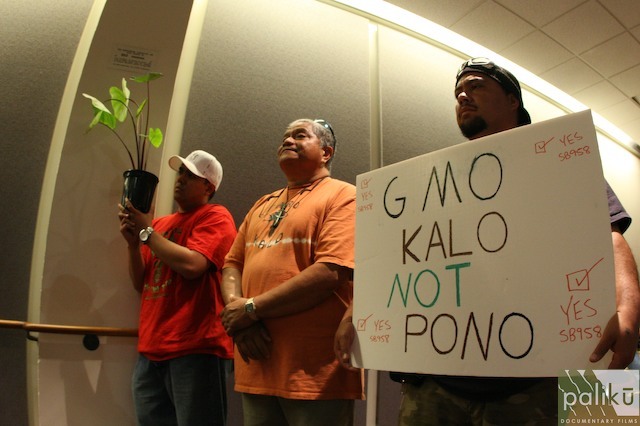
But we are not giving up.
“They should kill this bill and face the consequences and the wrath of the people. “It’s ridiculous. They don’t want to listen. But this is not the end. This is just the beginning.” – Jerry Konanui, Big Island Taro Farmer
The kuleana to protect elder brother, Haloa, is too important to turn our backs on! We stand with the taro farmers and the thousands of people who voiced uncompromised support for protecting Haloa. There are still four weeks left in the Legislative Session. And anything can happen. Learn more at the website and on the KAHEA blog.
In the meantime, every member of the Agriculture Committee is up for re-election this year. Prepare to plant your vote– Register to vote!
The momentum of this movement is stronger than ever. People all over the islands are now stepping up at the local level, starting campaigns of homegrown resolutions, speaking about this issue to every neighborhood board, at schools, registering voters, and continuing to take action, and to share.
This year could be revolutionary. Deepest mahalos to all who have shown their support and love, and who have taken action. This latest action is simply fuel for our imu! And we hungry!
Learn more:
See the Historic Movement to Save Haloa
A hearing was held March 19, 2008 to protect Hawai’i's ancestor and native crop – taro – from genetic modification and patenting. 6,000 people submitted written testimony in support. 8 hours of verbal testimony were given.
Now, the legislators need to pass this bill. Help them make the right decision. Click here to get involved.
Images from the hearing on SB 958:
http://maoliworld.ning.com/profile/Naalehu (click here to see more of Na’alehu’s pics)

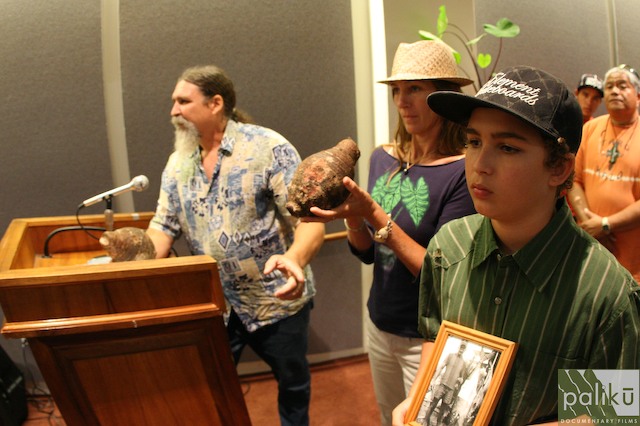
from KAHEA:
6,000 & growing...
from Marti:
Here is a letter that was published today in the Honolulu Advertiser (one of the few so far):
GENETIC MODIFICATION
CHANGING KALO ERODES HAWAIIANS’ LIFELINE
My mother used to serenade me with songs about exotic places. Travelogues of oceans, forests and island sweethearts. This is how she passed on knowledge. Songs reflecting simpler times and storytellers of the past. Our people were more disconnected than ever. Being Hawaiian was not popular. So to sing her aloha was her moment of self determination.
Her spiritual integrity impressed upon me indigenous ways of knowing. “Leave that popolo berry! It wants to grow there.”
If someone was to have told her she could no longer share limu among her classmates without a permit she would have sighed, “That’s why we going die out.” But she would respectfully accept it. She felt people saw her particular relationship with the ‘aina as peculiar.
Replanting kalo is the living lifeline that holds the stories of our past. Changing the genetic makeup of kalo will erode that lifeline.
Hawaiians are now re-establishing their priorities in maoli culture. A moratorium on varieties of maoli kalo and introduced kalo as specified in SB 958 is needed for more reasons than just keeping steroid-like pumped up food off our tables.
It’s needed so we can pass on to our keiki more than just “stones.” We can pass on the story of Haloa.
-Meala Bishop
Waiahole kalo farmer, Kane’ohe
To submit testimony on the protection of taro, click here.


